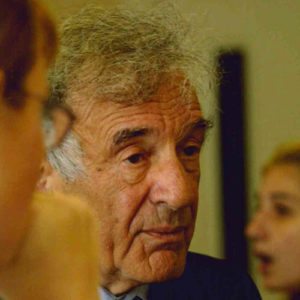I was privileged enough to have studied for a month with Dr. Wiesel at Eckerd College, but I first met him when he came to my high school to speak. I had to be in eighth or ninth grade at the time, and I was blown away by his humility, his passion and—beyond anything else—his utmost love of life and respect for all human beings.
Every freshman at Eckerd got to hear Dr. Wiesel speak, but he never gave a speech. My freshman year he stood at the podium after about a 10-minute introduction, looked out at the sea of people and said, “Now ask your questions.”
I even remember what I asked him. I stood up and asked, “With people in the world who preach nothing but violence and have threatened openly to wipe Israel off the face of the map, people like Ahmadinejad of Iran, how do you combat such evil?”
His response in one word floored me: “Education.” He said, “Educate them about the world and teach them to love.”
But as I got to know Dr. Wiesel in our month together at Eckerd, I realized that was exactly who Dr. Wiesel was. When he spoke, the room fell silent. I could record quotes that would rival all the great philosophers from what he said off the cuff. He always preached tolerance, acceptance, love, and respect toward all humankind.
I remember vividly the 15-minute private conversation I was privileged to have as a part of taking his class. As a child, I had always struggled with the concept of death and life, and I could never truly reconcile my love of life with my genuine fear of death. So when I got into the room with him, a man who has seen both the best and the absolute worst of humanity, I figured, Who better to ask, and who better to discuss it with. And while I won’t reveal most of our conversation, I will say that at the end of it, he said he had a book coming out the next year about exactly that topic and asked if I would like a copy once it was published in English. I, of course, jumped at the opportunity. A year later, in Winter Term 2013, I was on a night train headed from Bangkok to Chang Mai, Thailand, with his book Open Heart in my cabin, and I read it cover to cover that night, but by far the thing in the book that most exemplified him to me was the inscription, “To Mitchell, with every good wish. Elie Wiesel, Jan. 2013.”
“And yet,” the world has lost one of its utmost humanitarians. I could write my own novel about what a great man Elie Wiesel is and was, but the best thing I can ever say about him is that he was a true tzadik (righteous man) who, without question, the world was a better place having him in it.
RIP, my friend. The world should learn to live by your example.
—Mitchell Dobro ’13


